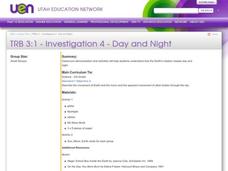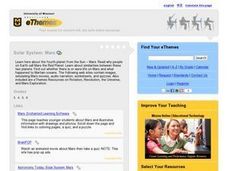Curated OER
The Earth's Rotation
Young scholars see a model of a globe to watch the Earth rotate. In this Earth lesson plan, students rotate the globe and shine a flashlight to see where the sun shines and how it rises and sets. They create a diagram and explain day and...
Voyage Solar System
Round and Round We Go — Exploring Orbits in the Solar System
Math and science come together in this cross-curricular astronomy lesson plan on planetary motion. Starting off with a hands-on activity that engages the class in exploring the geometry of circles and ellipses, this lesson plan then...
PHET
Planetary Magnetism
What do magnetic fields look like? The best way to learn about magnetic fields is to try identifying them for yourself. Scholars will understand the importance of magnetic fields after completing this experiment. The extension activities...
Curated OER
Solar Eclipse
Students demonstrate the revolution of the moon around the earth and the effect of its direct alignment in between the earth and the sun.
Curated OER
Graphing the Facts
Students investigate the correlation between our planet's weather and solar activity. They analyze and discuss data regarding the solar activity cycle, graph annual precipitation and temperature averages over a period of 100 years, and...
Curated OER
Spacecraft Launched on Mission to Pluto
Students read a news article about a space mission being launched to the planet Pluto. They study the necessary vocabulary and complete an anticipation guide of questions which they revisit after they read the article.
NASA
Solar System Scale & Size
Use a variety of whole fruits to represent the different planets in the solar system to introduce scale sizes to your math or space science class. They follow suit by creating a non-scaled model of the solar system using specific-colored...
Curated OER
Sensing the Invisible
Students study visible light and explain why we want to use infrared radiation to study Mercury. In this sunlight instructional activity students construct a device to measure the presence of infrared radiation in sunlight.
Curated OER
Day and Night
Third graders view a classroom simulation that demonstrates how the Earth's rotation creates day and night.
Curated OER
Windows to the Universe Scavenger Hunt
Students access the Internet to go on a scavenger hunt to investigate the solar system. In this space mission lessons students fill out a worksheet and explain how technology and scientific inquiry have helped us learn about the...
Curated OER
Finding the Pole Star
Students study the constellations fo the Big Dipper and Cassiopeia and their use in finding the Pole Star. They realize that other celestial objects--Sun, Moon and planets--share the rotation (and hence rise and set), even though their...
Curated OER
Solar Effects on Global Warming
Students explore the greenhouse effect and how it affects our climate. In this global warming instructional activity students draw the sun and label features and describe the effects of the sun's energy on the world.
Curated OER
What Orbital Dynamic Variables are Responsible for Earth's Weather?
Students explore the changing of the seasons. In this astronomy and seasons instructional activity, students construct a model of the revolution of the sun and the moon. Students compare the recorded solstice/equinox orbital positions...
Curated OER
The Sky Jeopardy
First graders reinforce concepts about sun, moon, day, night and sky by playing the Sky Jeopardy game. In the end, 1st graders get to nibble crackers in order to show the different phases of the moon.
Curated OER
The Mathematical Dynamics of Celestial Navigation and Astronavigation
Students explore the different methods used in celestial Navigation and astronavigation. In this math lesson, students construct a sextant and demonstrate how it works.
Curated OER
Does the Distance Between the Earth and Sun Cause the seasons?
Learners reflect upon the concepts of seasons. The concepts are taught using a variety of different teaching approaches. A activities lead to a reflection that will help students to make a cognitive transfer of information form...
Curated OER
The Earth, Sun Mood and Stars Unit (Planets too!)
Fifth graders prepare five activities to do then show their energy saving skills. In this investigative lesson students create five projects then participate in an energy saving demonstration.
Curated OER
Pollution - What is It Doing to Us?
Students recognize some forms of pollution. In this science lesson plan, students recognize and understand some of the devastating effects of the acid rains and other possible factors that are contrary to the pH balance of nature.
Space Awareness
Climate Zones
The climate at the equator is hotter than the climate at the poles, but why? The lesson plan goes in depth, explaining how the angles of illumination relate to the heating rate at different latitudes and seasons. Scholars use a strong...
Curated OER
Earth
First graders define what a planet is and study the planet earth. They examine the effects of the sun on the earth and make a model.
Curated OER
Sunspots: Correlating Sunspots to Active Regions
Students investigate sunspots. They use solar imaging from satellite instruments which are currently circling the sun. Students compare images from the satellites and determine the existence of a correlation between the two types of...
Curated OER
Solar System: Mars
Students research Mars, read why it is called the Red Planet and find out whether there is or was life on Mars.
Curated OER
Astronomy and Me: Moons Over New Haven
Third graders study the features of different moons orbiting the planets. In this astronomy lesson, 3rd graders explore the different phases of the moon using an interactive online website. They compare and contrast the features of the...

























